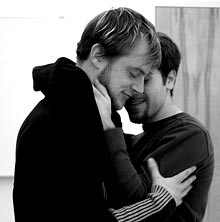History is filled with stories of powerful, influential rulers. Their lives and legacies are often considered reflections of their times, representing the culture and the people during their reigns. Their stories can bring the past to life in profound ways, with their turmoil, triumphs, passions and torments becoming symbolic of something far greater than a devotion to a country or a crown.

It is just this kind of story that Black Swan Theater and Junction City Productions hope to tell with Crown of Shadows, a three-weekend festival of three new full-length plays. The event presents one play per weekend—Edward the King, Gilgamesh and Hat—all written by local luminary David Hopes.
Hopes, a professor of literature and creative writing at UNCA, is a prolific author who has published a number of works of poetry, fiction and nonfiction, in addition to writing award-winning plays. He also founded Pisgah Players, which later became Black Swan Theater.
“These are all stories about love, and how it takes top priority in the ruling class,” Hopes says. “They’re thematically very connected.”
Edward the King offers a contemporary take on Christopher Marlowe’s play Edward II, which centers on an English king who found love where he least expected it: in the arms of a young man named Gaveston. The Asheville performance will be the play’s premiere, though it gets a more high-profile production at Gayfest NYC in May. (It’s worth noting that Edward the King will kick off the New York festival, whose organizers selected the play from more than 400 submitted works.)
The second production, Gilgamesh, may be familiar to those who have followed local dance performances; its debut took place here in 2006. The production turns the epic poem about the King of Uruk (who lived around 2,600 B.C.E.) into something more approachable and modern, but retains much of its classical heritage.
“Gilgamesh interfaces with the divine on a regular basis,” notes Mickey Hanley, director of Junction City Productions and co-director of the Crown of Shadows festival. “It’s a legendary tale filled with goddesses and beast-men, where trees and stone monuments come to life.”
The final Crown of Shadows play is Hat, short for Hatshepsut, which tells the story of the first woman to rule as a pharaoh in ancient Egypt. Hanley says that the play “takes a modern look at historical events under the rule of Hatshepsut. [She] is one of the most fascinating women in history.”
Hanley notes that Hat’s reign seemed to proclaim “I am pharaoh, and my sex is irrelevant.”
The performance is also Hat‘s debut, and like most of Hopes’ work, there’s more to the production than a simple retelling of history.
“The story begins with two goddesses as they wake Hat from her ancient sleep, calling her into a world that needs a powerful woman to temper the power in man’s hands,” Hopes explains.
The playwright insists that the plays and their lessons are accessible to everyone.
“You don’t have to be a king to understand a clash of desires, [or] what happens when we choose to love the wrong people,” he offers. “The function of Greek theater was to make the audience recognize that they could be walking the path of their tragic heroes. This [festival] will have a similar effect. I’m hoping it will be a fascinating good time, but also [that it will] bring up the question: How much of me is in this, and do I like it?”
One of the most impressive aspects of the Crown of Shadows festival is that the cast is virtually the same for each play. Actors overlap in every show, and many of them are rehearsing from three different scripts every other day.
“For our two big leads, the men who play opposite each other in Edward the King and in Gilgamesh, the roles are monumentally challenging,” says Hanley. She says that one of the biggest challenges is finding ways “to make Gaveston different from Gilgamesh, to make Edward different from Enkidu.”
However, Hanley declares that the two actors embodying the characters of these great figures, Cody Magourik and Adam Kampouris, are up to the challenge and are growing as actors because of it.
But the challenges don’t end with the cast. Brian Sneeden, the festival’s lighting and sound designer, says these productions have been some of the most demanding of his career. “I’ve worked to create digital arrangements that reflect traditional instruments of Sumerian and Egyptian culture. All of the plays are epic, and each stands on its own.”
Although the sets for these performances will tend toward the minimalist, the cast will be clad in colorful, locally made costumes. Patrons can expect a set of lush, nuanced performances showcasing the big dreams and bigger drama of these huge figures from history and myth.
“That’s what we want to see plays about, isn’t it? About someone whose passion exceeds our own?” asks Hopes. “In some ways, these are people we would never want to be, but they’re so much fun to watch in action.”
Each performance will be preceded by an original dance piece choreographed and performed by Lyle Laney. Please note that these plays contain scenes of near nudity and are intended for mature audiences.
who: Black Swan Theater and Junction City Productions present Crown of Shadows
what: A three-play theater festival spanning three weekends
where: Asheville Arts Center (308 Merrimon Ave.)
when: 8 p.m on Fridays and Saturdays/ 3 p.m. on Sundays.



I saw Gilgamesh, wonderful. We need more of this type of theatre in Asheville. We need to see more good plays at reasonable prices. This is “big league” stuff in a small town. Please, More of Hopes. We don’t need to wait for the “tourists” to return to have great stuff presented…we locals can appreciate it too.